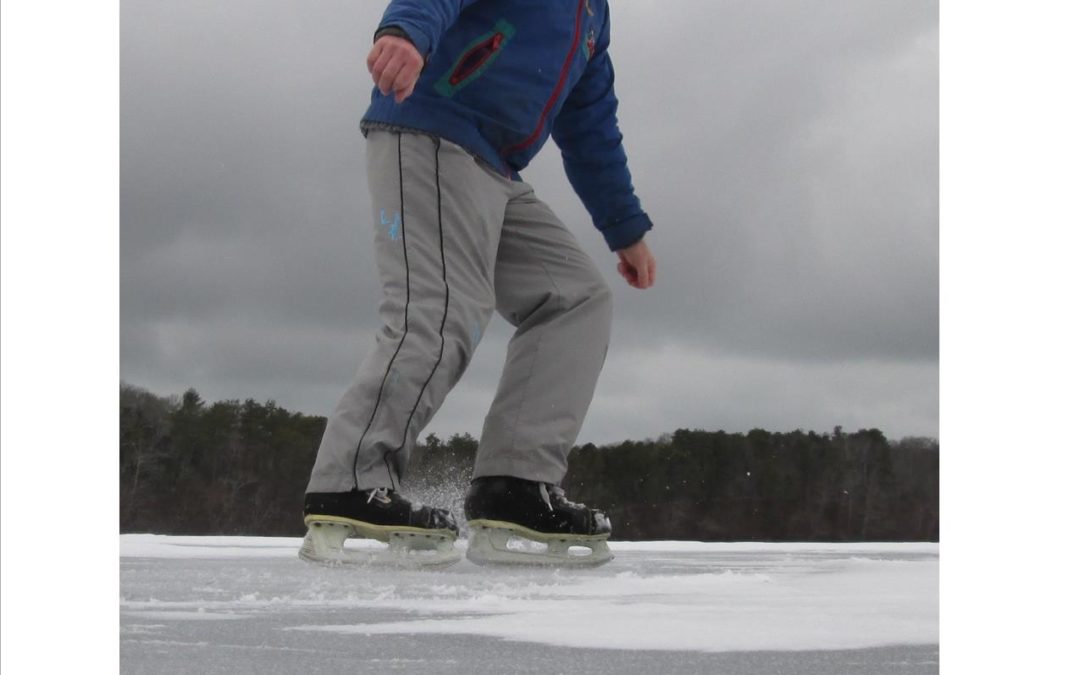We sent our advisor Mark Robinson back into the field, this time to study water quality in Sheep Pond, one of the top five cleanest ponds in Brewster.
I was glad to see some ice fishing holes on Sheep Pond on this gray day in early March. That meant I would have an easier time sampling the water quality off Fisherman’s Land- ing. But I forgot my collection bottles. Oh, well–never let a field assignment ruin a good skate. My friend, noted Austrian photographer Herb Doppelganger, was visiting and since he enjoyed “ze vinter sports,” he tagged along to record my visit. It soon became apparent that the pondshore sign announcing “No Skating”, was more fact than admonition.
The ice was terrible.
Despite three straight weeks of sub-freezing temps and a six-inch thick buildup, the Cape’s frequent small snowstorms had frozen, thawed and refroze on top of the pond. It was Jekyll and Hyde: some sections smooth and black ice, some portions crusty and faulty. But we made a full circuit of the pond, one of Brewster’s largest at 138 acres and one of the Cape’s deepest at 65 feet, in a little less than an hour, inspecting the human and faunal evidence in turn.
No one was tending the ice holes as we started out, maybe they had left for lunch, but several had not yet frozen back. There is no black like the water in an ice hole. It is a soul-less black. We skated jerkily along the southern shore, turned a point and came across a little red fox. He sat on his haunches with the bushy tail curled around his forepaws. He watched us, then turned and easily headed for the woods. We backtracked him over the snow on the ice—he had crossed the pond from north to south. We found a companion set of tracks, slightly bigger, straight and measured gait—a coyote’s.
In the middle of the pond there was a giant gash of open water, full of mallards. Ducks and geese migrating the Atlantic Flyway love the Cape, its many (usually) open water ponds and bays, even in the harshest of winters like this one. We wondered what hydrologic tale could be spun about how ice could be a half-foot thick at one end of the pond and non-existent in the middle. Later, we learned from a local that there was a shallow bar across the pond that might account for the open water here. He also told us he used to skin dive near there to visit a Model T that had been sunk in the 1950s for rescue drills.
Herb and I had to gain the shore and bull through the brush to bypass the open wound of water.
Farther on, we rejoined the ice and leaned into the gray northeast wind, freighted with something, more snow perhaps. Summer detritus littered the shore, including half-sunk, un-kinetic kayaks and paddleboards, forlorn without the yelps of children to give them purpose for another four months.
Most of the shoreline around Sheep Pond is developed with homes, but the old ones are small, funky Cape cottages and the new ones, though large, are set behind a scrim of mature oaks, pines and tupelos. I told Herb that our Conservation Commissions have the thankless task of requiring builders to preserve a 50-foot buffer of trees between construction and the ponds.
We came across a particularly poor patch of crusty ice and I took a header, pitching forward into the little snow drift. Only my vaunted pride was hurt.
We struck across to the north end of the pond. Here were the three little cabins I recalled, hunched under the tall bank. One had sprouted a solar panel mounted in the yard. They might be the most primitive cabins left in Brewster—could never be built today and meet codes. Behind them is the 74 acres of pine-oak forest purchased by the town for conservation in the late-1990s. The Sheep Pond Woodlands includes Capt. Small’s Bog, an overgrown 1800s cranberry patch, now all maples and high bush blueberries. The informal town landing on the pond at the foot of the bog might have hosted the irrigation pump for the bog at one time. Much of these town woods were purchased from the Rowley family. Dr. Harold F. Rowley (1905-2000) delivered more babies (6,000+) in Brewster and Harwich during his practice than any other doctor.
With a tailwind, we made the turn to run back, threading our way between the open water in the middle and the open water along the north shore, presumably kept open by the informal bubbler system keeping a boathouse dock from being damaged by the ice. I had never seen a bubbler in anything but salt water before. Anyway, more mallards seemed to like it. They lifted as we bothered them, but resettled in the middle.
The ice fishermen were back at their “work” as we neared the Landing. They had been concerned to see our shoes and skate tracks.
“Didn’t know if you would return,” one said. “That ice seems unstable out there.”
I have fought against opinions on ice safety my whole life. A winter-wise New Englander gets a sense of ice. Local rescue personnel just want skating banned, makes their job easier. But the only time I ever fell in was chasing a puck before it went over the thin edge when I was a boy. It was a cold walk home, I admit.
They had hauled out a nice looking rain- bow trout. Herb inquired about the gold spots on the snowy ice, “Vas is das?”
Derek Roberti of Arizona told him to feel the fish’s smooth belly. “She was full of eggs. We emptied most of them back into the water, but these were left.”
As we unlaced our skates, of course, it started to snow again.
Mark H. Robinson is the Executive Director of The Compact of Cape Cod Conservation Trusts, Inc. and has advised the Brewster Conservation Trust since 1986. He is also, of
course, Herbert Doppelganger.
Got a Pond Story you want to share? Email Kristin Andres at kandres@apcc.org
Pond Stories are a collection of writings from Cape Codders and visitors who love the 1000 local ponds that dot the Cape. We hope this collection of stories, that are as much endearing as they are environmentally aware, will awaken your inner environmentalist to think deeper about our human impacts to these unique bodies of water. Check out these valuable resources to learn more about the current challenges Cape Cod ponds are facing and how you can be a better pond steward in your town.


